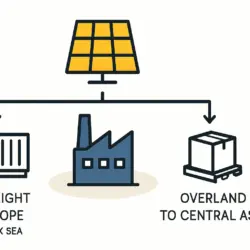Georgia has the potential to host up to 87 GW of solar power capacity, according to a recent study by the Georgia Institute of Technology. This capacity could generate around 150 TWh of power per year, potentially meeting the entire electricity demand in the state.
Study Reveals Georgia’s Massive Solar Power Potential
The study, published in the journal Energies, highlights the vast potential of solar power in Georgia. Researchers found that the state could accommodate between 7 GW and 87 GW of solar capacity, depending on the type of land used.
Led by Dr. Omar Issa, the study’s authors examined various land types across Georgia to determine the potential for solar power development. They found that urban areas alone could host between 7 GW and 14 GW of solar capacity. This could be achieved by installing rooftop solar panels and using open spaces within cities for solar farms.
In rural areas, the potential is even greater. The researchers estimate that between 47 GW and 87 GW of solar capacity could be installed on agricultural land, grasslands, and deserts. This would involve using large tracts of land for ground-mounted solar arrays, which can generate significant amounts of electricity.
Georgia Solar Power Driving Job Creation and Economic Growth
The shift towards solar power in Georgia promises significant economic benefits. The study estimates that installing solar panels across the state could create between 140,000 and 1.7 million jobs. These jobs would be in solar panel manufacturing, installation, maintenance, and related industries.
The economic impact would extend beyond job creation. Widespread adoption of solar power could reduce Georgia’s reliance on fossil fuels, leading to lower energy costs for consumers. Additionally, the growth of the solar industry could attract new businesses and investments to the state, further boosting the economy. Notably, Qcells is expanding its Georgia solar plant with a $1.45 billion loan, enhancing the state’s manufacturing capacity.
Environmental Benefits of Georgia Solar Power Adoption
The environmental benefits of transitioning to solar power in Georgia are equally significant. By reducing the state’s reliance on fossil fuels, solar energy could help lower greenhouse gas emissions and combat climate change. The researchers estimate that the widespread adoption of solar power could reduce CO2 emissions by as much as 68 million tons annually.
Solar power also offers other environmental benefits, such as reducing air pollution and conserving water. Unlike fossil fuel-based power plants, solar panels do not emit harmful pollutants or require large amounts of water for cooling. This makes solar energy a cleaner, more sustainable option for powering Georgia’s future.
Barriers and Challenges to Expanding Georgia Solar Power
Despite the potential benefits, there are challenges to implementing large-scale solar power in Georgia. One of the main barriers is the upfront cost of installing solar panels. While the price of solar technology has decreased significantly in recent years, the initial investment can still be prohibitive for many homeowners and businesses.
To overcome this hurdle, the study’s authors recommend that the government provide financial incentives, such as tax credits and grants, to encourage the adoption of solar power. They also suggest that utilities offer programs allowing customers to lease solar panels or participate in community solar projects, like the Georgia BRIGHT initiative.
Another challenge is the need for a reliable and efficient grid infrastructure to support the increased use of Georgia solar energy. The researchers emphasize the importance of modernizing the state’s energy grid to handle the fluctuations in power generation that come with solar energy. This could involve investing in energy storage systems and upgrading transmission lines to ensure a stable supply of electricity.
Harnessing Solar for a Greener, More Prosperous Georgia
The study by the Georgia Institute of Technology reveals the immense potential of solar power in Georgia. With the right policies and investments, the state could become a leader in renewable energy, creating jobs, reducing greenhouse gas emissions, and ensuring a sustainable future for its residents.
As Georgia moves towards a more sustainable energy future, the insights from this study could play a crucial role in shaping the state’s energy policies and strategies. By harnessing the power of the sun, Georgia has the opportunity to build a cleaner, greener, and more prosperous future for all its citizens.



